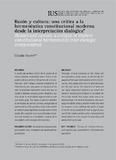Razón y cultura: una crítica a la hermenéutica constitucional moderna desde la interpretación dialógica
Fecha
2016Autor
Versión
Acceso abierto / Sarbide irekia
Tipo
Artículo / Artikulua
Versión
Versión publicada / Argitaratu den bertsioa
Impacto
|
|
nodoi-noplumx
|
Resumen
A través del análisis crítico de la teoría de la interpretación entendida como límite a los poderes de los últimos intérpretes de la Constitución, este trabajo intenta evidenciar la inexistencia, por una parte, de algunos de los más importantes baluartes sobre los que se funda el Estado constitucional moderno; por otra, la de la neutralidad argumentativa y de una razón pura. Por tanto, evidencia ...
[++]
A través del análisis crítico de la teoría de la interpretación entendida como límite a los poderes de los últimos intérpretes de la Constitución, este trabajo intenta evidenciar la inexistencia, por una parte, de algunos de los más importantes baluartes sobre los que se funda el Estado constitucional moderno; por otra, la de la neutralidad argumentativa y de una razón pura. Por tanto, evidencia también la necesidad de que los juristas, recogiendo el espíritu de la crítica jurídica como instrumento de análisis para dignificar nuestra convivencia social, den sustento a un nuevo Estado constitucional basado en el verdadero respeto de la pluralidad y del principio democrático. [--]
Through critical analysis of the theory of interpretation understood as limited by the powers of the past interpreters of the Constitution, this paper attempts to demonstrate, on the one hand, the absence of some of the most important bastions on which the modern constitutional State is founded. On the other hand, this paper also wants to demonstrate the lack of neutrality and pure argumentative ...
[++]
Through critical analysis of the theory of interpretation understood as limited by the powers of the past interpreters of the Constitution, this paper attempts to demonstrate, on the one hand, the absence of some of the most important bastions on which the modern constitutional State is founded. On the other hand, this paper also wants to demonstrate the lack of neutrality and pure argumentative reason, and therefore the need for lawyers, who utilizing the spirit of legal criticism as an analytical tool to dignify our social life, could sustain a new constitutional State based on true respect for plurality and democratic principle. [--]
Materias
Teoría de la interpretación,
Post-positivismo,
Interpretación postmoderna,
Pluralismo,
Theory of interpretation,
Post-positivism,
Postmodern interpretation,
Pluralism
Editor
Instituto de Ciencias Jurídicas de Puebla (México)
Publicado en
Ius: Revista del Instituto de Ciencias Jurídicas de Puebla, 10 (37), 33-58
Departamento
Universidad Pública de Navarra. Departamento de Derecho Público /
Nafarroako Unibertsitate Publikoa. Zuzenbide Publikoa Saila






